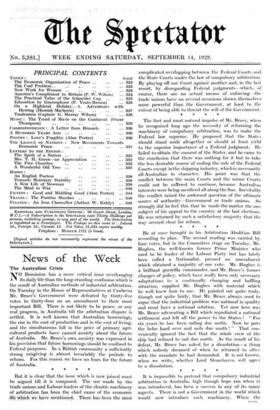it is impossible to pretend that compulsory_ industrial arbitration in
Australia, high though hope ran when i t .was- introduced, has- been a success in any of its many aspects. There is not a Government in the world which would now introduce such machinery. When the British miners read the Sankey Report they took fright at the obvious germ of compulsion which it contained— the compulsory renunciation of the right to strike. They had watched with dismay the results of the loss of that right in Australia. At least we ought to be grateful to the Australians for having, through much suffering, carried out an instructive experiment. The general moral seems to be that the will to agree is a prerequisite to true agreement. By all means let every industry have the permanent machinery of arbitration—something ready to be used whenever a dispute occurs. The existence of the apparatus would imply and strengthen an inclination towards settlement, but let us avoid the mistake of think- ing that peace can be secured by powers of enforcement vested in the Courts. Hundreds of thousands of men on strike cannot be made to work if they do not wish to work, however clearly a Court may have ruled against them. The only possible form of compulsion—physical compul- sion—would be a negation of all that the law had been aiming at,—even if it were practicable. In fine, the Courts are helpless in such circumstances, and suffer a deplorable loss of dignity and repute. There is the strongest possible moral analogy between arbitration in industry and arbitration in international affairs, because in both cases the object is simply the prevention of " war," but experience suggests that there can be no exact resemblance in the methods of the arbitration.
* * * *





































 Previous page
Previous page